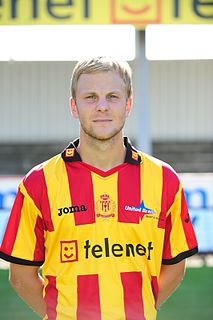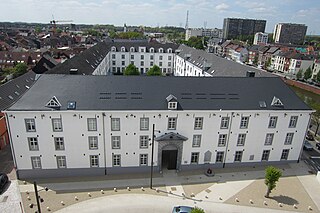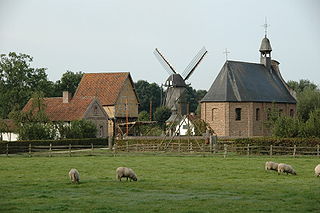
Weert is a municipality and city in the southeastern Netherlands located in the western part of the province of Limburg. It lies on the Eindhoven–Maastricht railway line, and is also astride the Zuid-Willemsvaart canal.

Sint-Oedenrode is a town in the province of North Brabant.

Mechelen is a city and municipality in the province of Antwerp in the Flemish Region of Belgium. The municipality comprises the city of Mechelen proper, some quarters at its outskirts, the hamlets of Nekkerspoel (adjacent) and Battel, as well as the villages of Walem, Heffen, Leest, Hombeek, and Muizen. The Dyle flows through the city, hence it is often referred to as the Dijlestad.

St. Rumbold's Cathedral is the Belgian metropolitan archiepiscopal cathedral in Mechelen, dedicated to Saint Rumbold, Christian missionary and martyr who had founded an abbey nearby. His remains are rumoured to be buried inside the cathedral. State-of-the-art examination of the relics honoured as Saint Rumbold's and kept in a shrine in the retro-choir, showed a life span of about 40 years and a death date between 580 and 655, while tradition had claimed 775 AD.

There are 27 municipalities with language facilities in Belgium which must offer linguistic services to residents in Dutch, French, or German in addition to their single official languages. All other municipalities – with the exception of those in the bilingual Brussels region – are unilingual and only offer services in their official languages, either Dutch or French.

Broek in Waterland is a village in the province of North Holland, Netherlands with a population of about 2,745 inhabitants as of 2021. It is a part of the municipality of Waterland, and is situated about 8 km south of Purmerend and 8 km northeast of Amsterdam.
Leo Albert Jozef "Lei" Clijsters was a Belgian professional footballer who played as a centre-back.

Mechelen is a town in the Dutch province of Limburg. It is a part of the municipality of Gulpen-Wittem, and lies about 13 km south of Heerlen.

Julien Gorius is a former French professional footballer who is currently a sporting director for RWDM47 in the Belgian First Division B.

The John Charles Centre for Sport is a sports facility in South Leeds, West Yorkshire, England. It consists of the South Leeds Stadium, Aquatics Centre, Indoor Athletics Centre and Tennis Centre. It was previously named the South Leeds Stadium and was renamed to honour John Charles (1931–2004), the former Leeds United, Juventus and Wales footballer. It is located to the south of Leeds city centre roughly on the border of Beeston, Belle Isle and Hunslet. The sports centre opened in 1996, with the Aquatics Centre opening in 2007.

The Mechelen transit camp, officially SS-Sammellager Mecheln in German, also known as the Dossin barracks, was a detention and deportation camp established in a former army barracks at Mechelen in German-occupied Belgium. It served as a point to gather Belgian Jews and Romani ahead of their deportation to concentration and extermination camps in Eastern Europe during the Holocaust.

The Bokrijk Provincial Domain is a park and museum complex near Genk, Province of Limburg in Belgium. It is known for its open-air museum which displays a large collection of historical buildings from across Flanders which presents the history of rural life in the region. The domain is 5.5 square kilometres (2.1 sq mi) in area and also hosts an important botanical garden (arboretum), nature reserve, and the largest open-air playground in Flanders.

Oud-Rekem is a village in the Lanaken municipality of the Limburg province of Belgium. The village is considered one of the most authentic villages of Belgium. Since 1994, it is protected as a monument.

Heindonk is a Belgian village in the municipality of Willebroek in the province of Antwerp in Belgium. It is situated northwest of the city of Mechelen.
Jean d'Oisy (1310–1377) was the architect of several ecclesiastical buildings in Brabantine Gothic style. He was one of the earliest introducers of northern French Gothic style into the Low Countries and a teacher of the reputed Brabantian architect Jacob van Thienen.

The Mechelen-Zuid water tower is a 143-metre-high (469 ft), combined water and telecommunications tower constructed in 1978. Since 1979, it has supplied the water to the city of Mechelen, Belgium, while also hosting television and telecommunications aerials. The concrete spire passes through a wide disc holding water fifty metres above the ground. Higher up, a smaller disc supports telecommunications equipment. Topped by a decorative stainless steel tube, it is claimed to be the highest water tower in the world.

SKEPP is an independent Belgian skeptical organization. The organization’s name is a backronym for Studiekring voor de Kritische Evaluatie van Pseudowetenschap en het Paranormale.
The precise number of websites blocked in Belgium is unknown. Blocking may vary from one Internet Service Provider (ISP) to another with some sites blocked by some ISPs and not by others.
The investigation, also known as Operation Zero officially and Operation Clean Hands informally, is conducted by the examining magistrate of Limburg, on behalf of the Belgian Federal Public Prosecutor's Office. The investigation is concerned with organized crime, money laundering and private corruption (bribery) in Belgian football, division 1A and division 1B specifically. Started in late 2017, the investigation rose to national prominence on October 10, 2018, when 44 house searches were carried out across Belgium and 14 more house searches internationally. 29 suspects were arrested in Belgium, and 4 more abroad. Of the 29 arrested in Belgium, 20 were charged with one or more crimes. During the weeks following the raids, 3 additional suspects were arrested and criminally charged.

't Asbroek is a nature domain and forest in the municipality of Schoten, Belgium, covering an area of 12 ha. The domain is owned by the municipality of Schoten and managed by nature conservation organisation Natuurpunt since 1998. It is officially recognised by the Flemish government as a nature reserve.

















